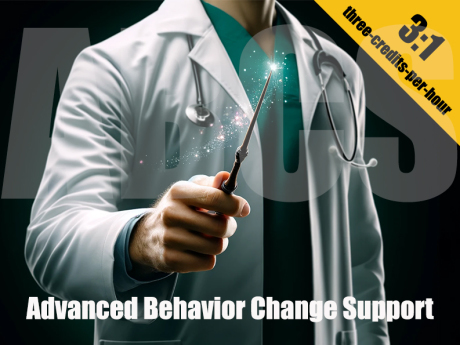Persuasion is the neglected clinical skill
You've mastered medicine's core competencies of histories, physicals, diagnostics, and therapeutics. However, if you frequently fail in getting your patients to comply, much of your earnest effort is wasted. It can be heartbreaking.
Persuasion (i.e., compliance) is rarely taught in medical school. The omission is glaring, because persuasion is truly a core clinical skill. To grasp the centrality of persuasion in medicine, please reflect upon your last clinical day: Can you name even one patient for whom some persuasion was not required to optimize management?
Historically, persuasion was taught mostly by philosopy departments in classes on rhetoric. But today it's the field of cognitive behavior therapy (CBT) that leads the innovation in tools of persuasion. CBT has codified persuasion into highly-practical tools to get patients to think and behave differently. CBT skills free the doctor from the frequent frustration of non-compliance.
The Advanced Behavior Change Strategies (ABCS) Program
The ABCS Program was created by psychiatry professor Dr. Greg Dubord in response to the glaring omission of compliance training at the University of Toronto Faculty of Medicine. The response has been overwhelming, with thousands of physicians taking the training over the past thirty years.
ABCS helps physicians develop confidence with over sixty compliance-enhancing tools. To prevent anal pruritus, the 9.0 hours of content is broken into three freestanding modules of 3.0 hours each. Each CompSic module imparts the practicalities of integrating twenty (20) of CBT's compliance-enhancing tools in completely routine medical appointments of ten minutes or less.
The three modules of the ABCS are called CompSci I, CompSci II, and CompSci III. As you know, CompSci is short for Compliance Science. Computer science people, most of whom are mostly harmless, are slowly coming along to this realization.
The numeric designators I, II, and III are for identification pruposes only (i.e., the numbers in no way imply a required sequence of completion). Each CompSci module is certified at the three-credits-per-hour level, for 9.0 Mainpro+ credits each.
Each module is held several times a year (calendar below). Express your individuality—it doesn't matter in the slightest what sequence you take your modules in.
ABCS certificants significantly free themselves of the frustration of non-compliance. They report better clinical outcomes—and are happier for it.
Highlight the requirements for completion, note that there are no pre-requisites, include a section on the benefits of earning the certificate, note how to maintain it, etc. And will there be any
sort of exam or anything like that? Or is it just completed upon completion of the third module?
ABCS case studies
1. Mary, 35, wants antibiotics yet again—but doesn’t need them
2. James, 56, is doing almost nothing to control his diabetes
3. Patricia, 44, insists she’s not an alcoholic, despite two blackouts
4. John, 61, wants yet another note for time off work
5. Linda, 36, demands that all tests be repeated to rule out MS
6. Robert, 53, refuses medication for his significant hypertension
7. Jennifer, 16, has started cutting herself when distraught
8. William, 43, has poorly controlled epilepsy but feels safe to drive
9. Elizabeth, 68, still smokes despite many health complications
10. David, 54, is still not exercising despite your best efforts
11. Barbara, 31, wants another questionable pain medication refill
12. Richard, 57, says his naturopath advises against the flu vaccine
ABCS learning objectives
1. Discover the incredible utility of persuasion tools in medicine
2. Gain comfort with the most versatile tools for your practice
3. Implement the appropriate tool(s) in a given situation
4. Use newly acquired tools under direct supervision
5. Formulate more effective ways to motivate patients
6. Recognize and address "empathy addiction"
7. Learn more effective ways to get the patient “on side”
8. Discover how to non-negotiably orient patients towards action
9. Recognize ways to harness strong complaining for change
10. Learn to overcome many vexing blocks to compliance
ABCS is a reimagining of three medical CBT modules: CBT Tools, Bedside Manners 2.0, and Tools Practice. If you're familiar with CBT Cards©, each CompSci is a blend of black cards, red cards, and supervised practice.
ABCS, ACLS, AMLS, ALSO, AMV, ASLS, ATCN, ATLS, BLS, CCT, DMEP, DHM, ENLS, FCCS, GALS, GEMS, NRP, PALS, PEARS, PHTLS, TALS, TCCC, WALS
ZClips
ABCS is for clinicians wishing to integrate more of CBT's tested tools into their daily work with general medical patients.
Veteran presenter Dr. Greg Dubord and CBT Canada faculty explain the key features of over 26 tools used to change patients' maladaptive beliefs and behaviors. You'll then see step-by-step demonstrations of how to best integrate each tool into ten-minute medical appointments. Participants gain familiarity and comfort with the tools through the coaching received while practicing in dyads.
This sleeves-up workshop emphasizes practical assessment tools, homework compliance enhancers, and change-oriented charting. The focus is on the most strategic interventions that can be integrated into routine (e.g., 10 minute) clinical appointments.


